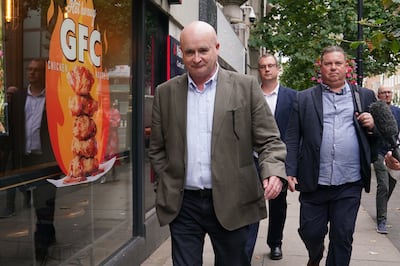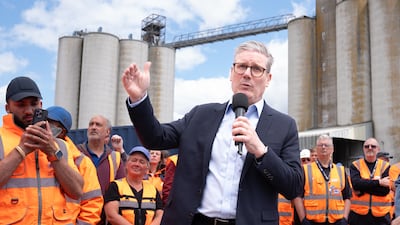The TUC Congress in Brighton was a dismal affair. Attendance was poor, the delegates were in a sombre mood. The Tories were in their pomp and it honestly felt as though the trade union movement did not have a future.
No one was listening to them, they had no ‘in’ with the government, they were seen as belonging to a bygone age – the images of which conjured up pictures of Britain on its knees, with bags of rubbish piling up on the streets, three-day weeks and electricity cuts. Their only role appeared to be as alternative HR adviser, able to deal with individual complaints. As for mass protest, certainly not, the lifeblood had drained from them.
That was several years ago. I was there as a reporter, and it was grim.
Next month, the unions will assemble again, also in Brighton. This time, the atmosphere will be very different. Labour is in Downing Street once more, with a thumping majority. Resourceful leaders, notably Mick Lynch from the RMT, train drivers’ union, have shown what can be achieved with targeted, staggered industrial action.
The unions are back; and with them the spectre of strikes and promises of ever higher public sector pay awards. Already, in the brief period since Labour won the election, we’ve seen the granting of two above-inflation rises for junior doctors and train drivers. GPS are demanding better terms or they will strike. GPs! Others will follow.
That is bound to occur under a new law to be proposed by Labour when Parliament returns from the summer break time. In the autumn, it will seek to repeal the Trade Union Act 2016, which set legal thresholds for how much support strike ballots require. Under the statute, brought in by Lord (David) Cameron’s government, at least half a union’s membership must take part in a strike vote for it to be valid. Further, for the “important public services” such as the NHS and transport, at least 40 per cent must have voted for action.
The unions are back; and with them the spectre of strikes and promises of ever higher public sector pay awards.
Angela Rayner, the Deputy Prime Minister, is determined to bring forward the Employment Rights Bill, which would enable strikes to be called with the support of far fewer members.
Given the scale of Labour’s victory, plus the fact that a substantial number of its MPs are on union tickets, their offices bankrolled by unions, along with the party’s recent election campaign, the proposal is bound to soon become law.
When Prime Minister Keir Starmer addresses the packed hall at their conference he will do so as the conquering hero, as the person who undid 14 years of Conservative rule. Be in no doubt, however, where power truly resides. If those listening and applauding wanted him removed, they could achieve it.
Suddenly, it does feel like the 1970s all over again. Then, it took Margaret Thatcher to drive the unions away. Unpredictably, that push was reinforced when Labour next took charge. Tony Blair created ‘New’ Labour to distance himself and his colleagues from the old. They had little time for the unions. The New Labour era was very much associated with nodding in the other direction. Indeed, Peter Mandelson, then Trade and Industry Secretary, said that New Labour was “intensely relaxed about people getting filthy rich as long as they pay their taxes”.
Already, the Starmer government seems set on returning to old Labour ways and values. They will say not, but the pace of reversal is startling, and alarming.
Mr Mandelson made his ‘love the rich’ comment as it became known, on a fact-finding mission to Silicon Valley. He was assuring a group of Hewlett-Packard senior executives as to where the Blair government stood.
He returned from that trip, enthused that Britain needed to replicate what he’d seen, and attract foreign investors. The country should have a modern, go-getting, world-beating, anything-is-possible, economy built around tech and growth industries.
In their run-up to winning, Mr Starmer and Rachel Reeves, now Chancellor, made it their task to woo the City. Day after day, for several months, one or both, was to be found at a breakfast, lunch, dinner with big business chiefs, persuading them that a Starmer administration would be good for business, that they were listening and these titans had nothing to fear. Part of the shtick as well was that they could be trusted with the economy.
That is not how it appears today. They have caved in to wage requests which, while they are in the public sector, only increase pressure on the private to follow suit. Not only that. Mr Starmer and Ms Reeves spent their time assuring the company leaders that they would behave responsibly where managing the economy was concerned, that they would be acting cautiously and bringing down inflation was a priority.
Then, bang. Inflation-exploding increases are handed down. More are certainly to come. If not, strike action will result – which this government will find hard to resist.
There was more to Labour’s overtures to the City. They said they would reduce red tape and bureaucracy. In house building and planning, moves are afoot to make this happen.
But wooing vitally desired capital is about much more than scrapping arcane rules and regulations. It’s to do with selling, creating an atmosphere that tells investors their funding is genuinely appreciated, that the authorities are with them and will endeavour to ensure their faith in the UK is well spent.
Or else, it’s simple: they will go elsewhere, to another nation that promises and delivers more. Mr Starmer would be foolish if he failed to understand just how competitive this global market remains – turning Britain back conveys a terrible image.
So, at Brighton, he must deliver two messages. One is of gratitude and empathy; the other is of reality, as to where Britain sits today and what it needs to do to attract investment that creates jobs. It wants, as Mr Mandelson said, to replicate Silicon Valley. Mr Starmer may wish to omit the ‘love the rich’ bit on this occasion, but neither should he lean too much the other way. It’s a fine balance and he must stick to it.
How Apple's credit card works
The Apple Card looks different from a traditional credit card — there's no number on the front and the users' name is etched in metal. The card expands the company's digital Apple Pay services, marrying the physical card to a virtual one and integrating both with the iPhone. Its attributes include quick sign-up, elimination of most fees, strong security protections and cash back.
What does it cost?
Apple says there are no fees associated with the card. That means no late fee, no annual fee, no international fee and no over-the-limit fees. It also said it aims to have among the lowest interest rates in the industry. Users must have an iPhone to use the card, which comes at a cost. But they will earn cash back on their purchases — 3 per cent on Apple purchases, 2 per cent on those with the virtual card and 1 per cent with the physical card. Apple says it is the only card to provide those rewards in real time, so that cash earned can be used immediately.
What will the interest rate be?
The card doesn't come out until summer but Apple has said that as of March, the variable annual percentage rate on the card could be anywhere from 13.24 per cent to 24.24 per cent based on creditworthiness. That's in line with the rest of the market, according to analysts
What about security?
The physical card has no numbers so purchases are made with the embedded chip and the digital version lives in your Apple Wallet on your phone, where it's protected by fingerprints or facial recognition. That means that even if someone steals your phone, they won't be able to use the card to buy things.
Is it easy to use?
Apple says users will be able to sign up for the card in the Wallet app on their iPhone and begin using it almost immediately. It also tracks spending on the phone in a more user-friendly format, eliminating some of the gibberish that fills a traditional credit card statement. Plus it includes some budgeting tools, such as tracking spending and providing estimates of how much interest could be charged on a purchase to help people make an informed decision.
* Associated Press
MATCH INFO
Liverpool 4 (Salah (pen 4, 33', & pen 88', Van Dijk (20')
Leeds United 3 (Harrison 12', Bamford 30', Klich 66')
Man of the match Mohamed Salah (Liverpool)
Cricket World Cup League Two
Teams
Oman, UAE, Namibia
Al Amerat, Muscat
Results
Oman beat UAE by five wickets
UAE beat Namibia by eight runs
Namibia beat Oman by 52 runs
UAE beat Namibia by eight wickets
Fixtures
Saturday January 11 - UAE v Oman
Sunday January 12 – Oman v Namibia
The specs: 2018 Chevrolet Trailblazer
Price, base / as tested Dh99,000 / Dh132,000
Engine 3.6L V6
Transmission: Six-speed automatic
Power 275hp @ 6,000rpm
Torque 350Nm @ 3,700rpm
Fuel economy combined 12.2L / 100km
Ferrari 12Cilindri specs
Engine: naturally aspirated 6.5-liter V12
Power: 819hp
Torque: 678Nm at 7,250rpm
Price: From Dh1,700,000
Available: Now
Our legal consultant
Name: Hassan Mohsen Elhais
Position: legal consultant with Al Rowaad Advocates and Legal Consultants.
How to watch Ireland v Pakistan in UAE
When: The one-off Test starts on Friday, May 11
What time: Each day’s play is scheduled to start at 2pm UAE time.
TV: The match will be broadcast on OSN Sports Cricket HD. Subscribers to the channel can also stream the action live on OSN Play.
Dhadak 2
Director: Shazia Iqbal
Starring: Siddhant Chaturvedi, Triptii Dimri
Rating: 1/5
Red flags
- Promises of high, fixed or 'guaranteed' returns.
- Unregulated structured products or complex investments often used to bypass traditional safeguards.
- Lack of clear information, vague language, no access to audited financials.
- Overseas companies targeting investors in other jurisdictions - this can make legal recovery difficult.
- Hard-selling tactics - creating urgency, offering 'exclusive' deals.
Courtesy: Carol Glynn, founder of Conscious Finance Coaching
Paatal Lok season two
Directors: Avinash Arun, Prosit Roy
Stars: Jaideep Ahlawat, Ishwak Singh, Lc Sekhose, Merenla Imsong
Rating: 4.5/5
The%20specs%20
%3Cp%3E%3Cstrong%3EEngine%3A%20%3C%2Fstrong%3E2.0-litre%204cyl%20turbo%0D%3Cbr%3E%3Cstrong%3EPower%3A%20%3C%2Fstrong%3E261hp%20at%205%2C500rpm%0D%3Cbr%3E%3Cstrong%3ETorque%3A%20%3C%2Fstrong%3E400Nm%20at%201%2C750-4%2C000rpm%0D%3Cbr%3E%3Cstrong%3ETransmission%3A%20%3C%2Fstrong%3E7-speed%20dual-clutch%20auto%0D%3Cbr%3E%3Cstrong%3EFuel%20consumption%3A%20%3C%2Fstrong%3E10.5L%2F100km%0D%3Cbr%3E%3Cstrong%3EOn%20sale%3A%20%3C%2Fstrong%3ENow%0D%3Cbr%3E%3Cstrong%3EPrice%3A%20%3C%2Fstrong%3EFrom%20Dh129%2C999%20(VX%20Luxury)%3B%20from%20Dh149%2C999%20(VX%20Black%20Gold)%3C%2Fp%3E%0A
The details
Colette
Director: Wash Westmoreland
Starring: Keira Knightley, Dominic West
Our take: 3/5
The specs
Engine: 3.0-litre six-cylinder turbo
Power: 398hp from 5,250rpm
Torque: 580Nm at 1,900-4,800rpm
Transmission: Eight-speed auto
Fuel economy, combined: 6.5L/100km
On sale: December
Price: From Dh330,000 (estimate)
Why are asylum seekers being housed in hotels?
The number of asylum applications in the UK has reached a new record high, driven by those illegally entering the country in small boats crossing the English Channel.
A total of 111,084 people applied for asylum in the UK in the year to June 2025, the highest number for any 12-month period since current records began in 2001.
Asylum seekers and their families can be housed in temporary accommodation while their claim is assessed.
The Home Office provides the accommodation, meaning asylum seekers cannot choose where they live.
When there is not enough housing, the Home Office can move people to hotels or large sites like former military bases.
MATCH INFO
What: 2006 World Cup quarter-final
When: July 1
Where: Gelsenkirchen Stadium, Gelsenkirchen, Germany
Result:
England 0 Portugal 0
(Portugal win 3-1 on penalties)
THREE
%3Cp%3EDirector%3A%20Nayla%20Al%20Khaja%3C%2Fp%3E%0A%3Cp%3EStarring%3A%20Jefferson%20Hall%2C%20Faten%20Ahmed%2C%20Noura%20Alabed%2C%20Saud%20Alzarooni%3C%2Fp%3E%0A%3Cp%3ERating%3A%203.5%2F5%3C%2Fp%3E%0A
Specs
Engine: Electric motor generating 54.2kWh (Cooper SE and Aceman SE), 64.6kW (Countryman All4 SE)
Power: 218hp (Cooper and Aceman), 313hp (Countryman)
Torque: 330Nm (Cooper and Aceman), 494Nm (Countryman)
On sale: Now
Price: From Dh158,000 (Cooper), Dh168,000 (Aceman), Dh190,000 (Countryman)



